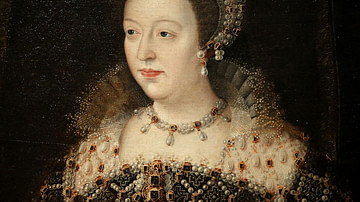Search
Did you mean: Mars?
Search Results

Definition
French Consulate
The French Consulate was the government of the First French Republic from 10 November 1799 to 18 May 1804, spanning the last four years of the Republic's existence. Headed by Napoleon Bonaparte (1769-1821) as First Consul, the Consulate served...

Definition
Joachim Murat
Joachim Murat (1767-1815) was a French cavalry officer who fought in the French Revolutionary Wars (1792-1802) and Napoleonic Wars (1803-1815). He was appointed marshal of the French Empire in 1804, Grand Duke of Berg in 1806, and ruled as...

Article
Battle of the Nile
The Battle of the Nile (1-2 August 1798), or the Battle of Aboukir Bay, saw a British fleet led by Rear-Admiral Sir Horatio Nelson (1758-1805) destroy a French fleet at Aboukir Bay near the Rosetta mouth of the Nile River. It was one of the...

Definition
Charlemagne
Charlemagne (Charles the Great, also known as Charles I, l. 742-814) was King of the Franks (r. 768-814), King of the Franks and Lombards (r. 774-814), and Holy Roman Emperor (r. 800-814). He is among the best-known and most influential figures...

Definition
Catherine de' Medici
Catherine de' Medici (l. 1519-1589) was the queen of France, mother of three kings and two queens and, between 1559 and c. 1576, the most powerful woman in France and, possibly, all of Europe. She was the strength behind the French throne...

Definition
Rashidun Caliphate
The first four caliphs of the Islamic empire – Abu Bakr, Umar, Uthman, and Ali are referred to as Rashidun (rightly guided) Caliphs (632-661 CE) by mainstream Sunni Muslims. Their tenure started with the death of Prophet Muhammad in 632 CE...

Definition
Charles I of England
Charles I of England (r. 1625-1649) was a Stuart king who, like his father James I of England (r. 1603-1625), viewed himself as a monarch with absolute power and a divine right to rule. His lack of compromise with Parliament led to the English...

Definition
Henry VII of England
Henry VII of England ruled as king from 1485 to 1509 CE. Henry, representing the Lancaster cause during the Wars of the Roses (1455-1487 CE), defeated and killed his predecessor the Yorkist king Richard III of England (r. 1483-1485 CE) at...

Definition
Jan Žižka
Jan Žižka (l. c. 1360 – 1424) was a Czech general and one of the most brilliant tacticians in military history. In the Hussite Wars (1419 to c. 1434), he was undefeated as the leader of the Hussites against the Catholic loyalists. Even completely...

Definition
Edward IV of England
Edward IV of England ruled as king from 1461 to 1470 CE and again from 1471 to 1483 CE. The Hundred Years' War (1337-1453 CE) had been lost by Edward's predecessor, Henry VI of England (1422-1461 CE & 1470-1471 CE), leaving Calais as the...